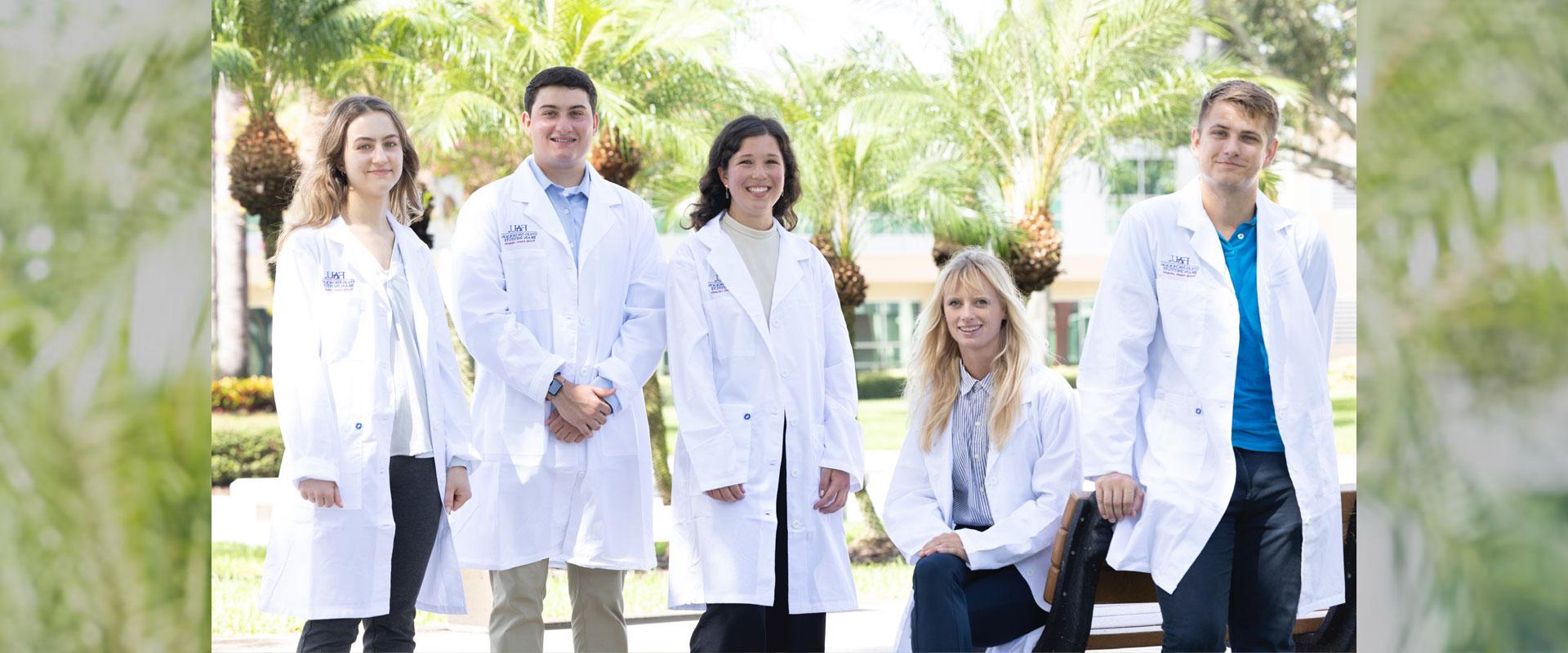Budding Neuroscientists Access World-class Research Opportunities

Five students recently joined the Florida Atlantic Neuroscience Graduate Program (NGP). The interdisciplinary program, administered by the Stiles-Nicholson Brain Institute (SBNI), immerses students in hands-on research that spans the breadth of neuroscience inquiry.
The NGP program provides one-of-a-kind training opportunities for those at the beginning stages of their neuroscientific careers, in three areas of emphasis: theoretical and computational neuroscience; cellular, molecular and biomedical; and neuroscience sensorimotor, cognitive and behavioral neuroscience.
During their first year, students are introduced to different areas of research through a series of three internship rotations in NGP faculty labs.
“I was attracted to the Ph.D. neuroscience program at FAU specifically for the outstanding faculty and cutting-edge research as well as opportunities for collaboration with the Max Planck Florida Institute for Neuroscience,” said Belle Krubitski, a new NGP student. “I was also excited to have the ability to rotate and experience working in different labs and learning new techniques.”
Krubitski was one of four new NGP students chosen as inaugural Ewing Capotosto fellows, funded by philanthropists Anna Ewing and John Capotosto to support students during their first year in the program with matching funds from the Brain Institute to support their second-year studies.
“I started my career at the dawn of the digital age and have witnessed first-hand how technology can revolutionize our lives,” Ewing said. “With advancements in big data and artificial intelligence, we have the opportunity to accelerate our discovery of new treatments and cures, and SNBI has a leading role to play in this journey.”
Ewing also cited the NGP’s interdisciplinary approach as an important factor in wanting to support students in the program.
“The diversity of experience, coupled with cutting-edge research capabilities, facilitates new discoveries, and we want the best and brightest students to lead this research,” she said.
Fellows were selected based on academic performance and high potential for success as graduate students, according to Randy D. Blakely, Ph.D., executive director of Brain Institute and director of the NGP. “This fellowship helps these promising young scientists shed some of the financial burden of pursuing their doctorates so they can focus on developing their knowledge and skills and take full advantage of the world-class research opportunities available to them at FAU,” he said.
Two women behind the recruitment of students to the Neuroscience Graduate Program (NGP), spearhead the educational program, including rotations, laboratory selection and awarding degrees.
Kathleen Guthrie, Ph.D., professor of biomedical science, Charles E. Schmidt College of Medicine, is the assistant director, Education, Florida Atlantic Stiles-Nicholson Brain Institute, and Linda Petersen, is a coordinator of the NGP.

Guthrie, who earned a doctorate in neuroscience from the University of California, Irvine, leads the Guthrie Research Laboratory, which investigates the development and survival of new neurons in the adult brain in mouse models of neurological disorders, including Huntington’s disease, epilepsy and autism spectrum disorders, said Randy Blakely, Ph.D., executive director of the Brain Institute. “Kate is an experienced researcher who knows what it takes to succeed in academic neuroscience and how to help the trainees make good choices as they move from their first steps in the program to walking across the stage with their diploma,” said Blakely, adding she also serves on the editorial board of the Journal Scientific Reports.

Petersen earned a bachelor’s degree in computer information science from Missouri State University, and began her career with the Missouri Department of Justice. Her career led her to Boca Raton, Fla., where she was in education for eight years at Spanish River Christian School. In 2014, she started working for the Graduate College and soon transitioned to the Brain Institute. “Linda brings experience from her prior role at the Graduate College to help manage recruitment of students and see them through to graduation,” Blakely said. “Heir guidance is at the heart of the NGP program.”

‘The generosity of Ms. Ewing and Mr. Capotosto enables me to focus on my studies and inspires me to make meaningful contributions to the field of neuroscience.’
– Tessa Dallo

‘The Ewing Capotosto Fellowship reduced some of the financial burden of a graduate degree and provided me the unique opportunity to attend academic conferences that may not have been feasible without it.’
– Tyler Sarovich

‘The Ewing Capotosto Fellowship played a pivotal role in my decision to come to FAU and has allowed me to pursue my academic goals with an unwavering focus and determination.’
– Belle Krubitski

‘With the help of the fellowship, I am now able to pursue my Ph.D. with significantly less financial burdens and focus entirely on my studies and achieving my career goals and dreams.’
– Alina Dreps

Andy Crider received a Presidential Fellowship from the Florida Atlantic Graduate College, a two-year award granted to first-year doctoral students who exhibit superior qualifications as determined by the NGP admissions committee.
